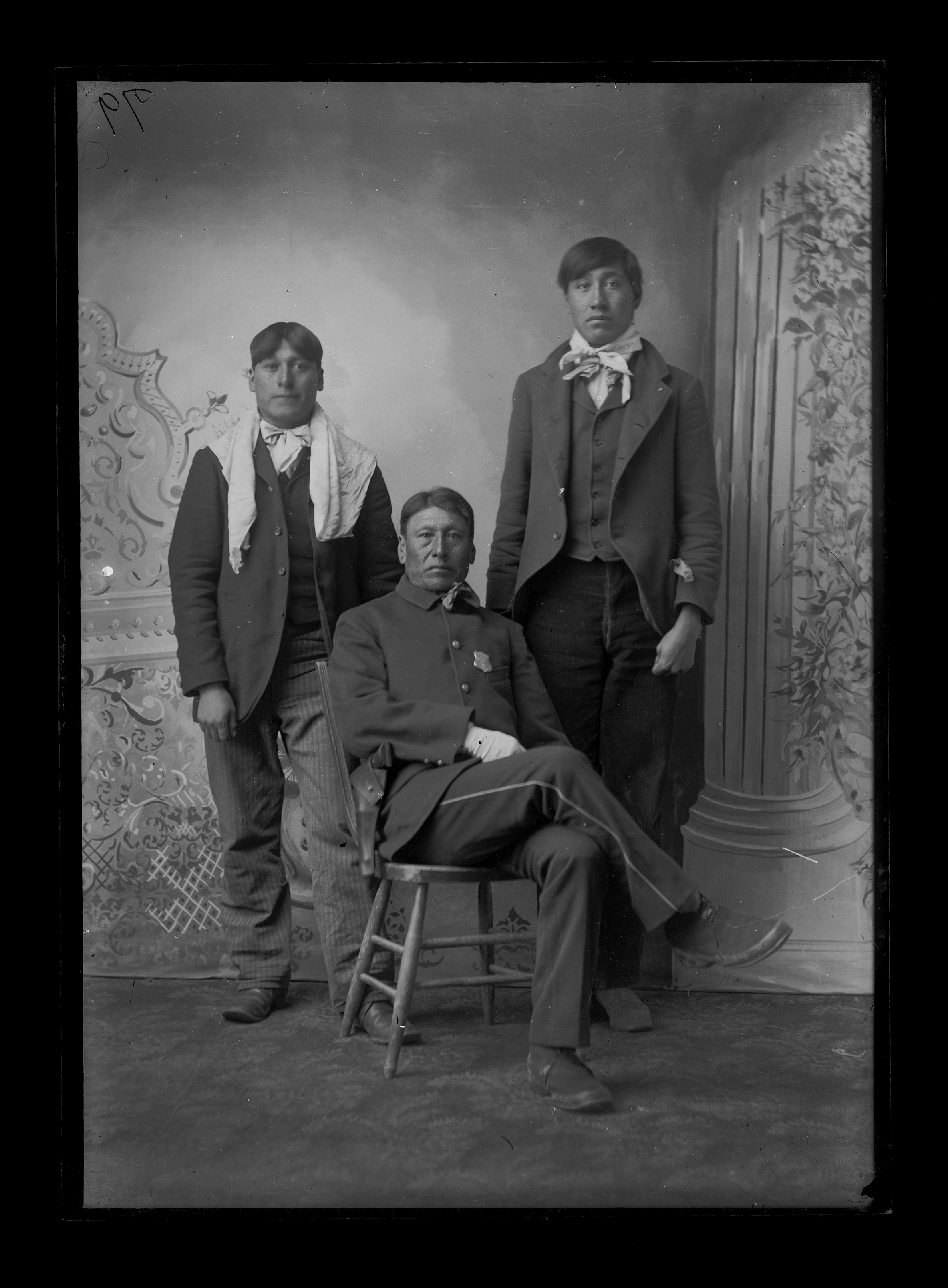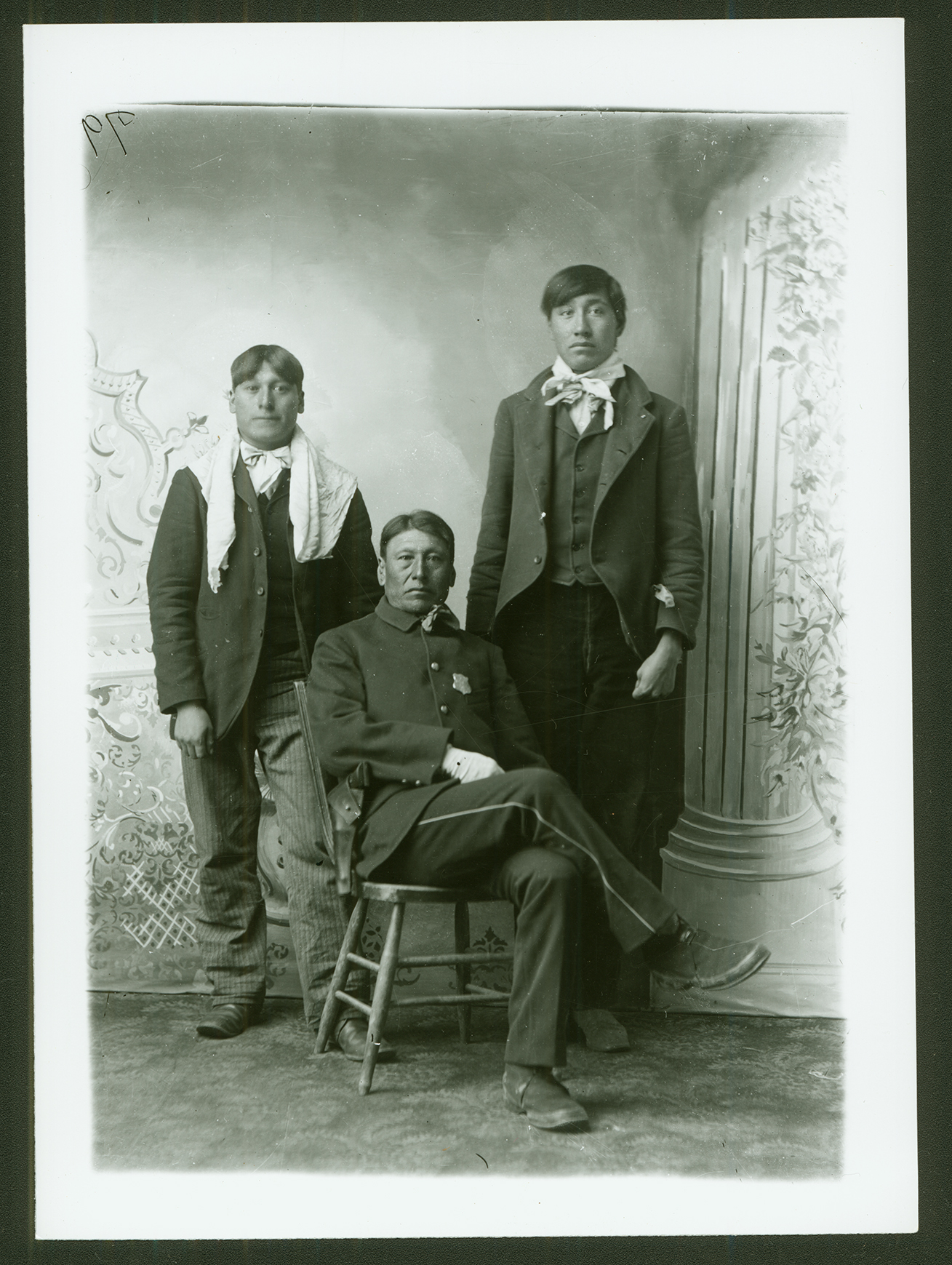Collection: 1952 - Frank Bennett Fiske
Item: 02042
Title: No Heart, Albert Stone Man and Martin Stone Man
Date: 1910
Creator: Fiske, Frank Bennett,--1883-1952
Inscription/Marks: [Handwritten in notebook] l-r: Albert No Heart, Stone Man, Stone Man's son.
Funeral Services Held for Fort Yates Resident Friday] Funeral services were held at the Congregational church four miles north of Fort Yates on Friday morning of last week for Albert No Heart, who passed away at the local hospital on Wednesday evening, a victim of pneumonia. Reverend Long Elk, of Cannonball, officiated at the services which a large number of relatives and friends attended to pay their last respects to the deceased whose sudden death was a shock to his numerous Fort Yates friends and fellow tribesmen throughout the reservation country. Deceased was 68 years of age at the time of his death and seemed to always enjoy health up to a short time prior to his demise and it is thought that sorrowing for a son, Harry of twenty years, who died on April 16th combined with his illness was beyond stoical Albert’s power to cope with. As if in accord with the spirits of the sorrowing mourners, a leaden sky overhung the G. W. Reed Congregational Cemetery a mile south of Fort Yates as the large gathering stood in bowed head silence while Reverend Long Elk spoke a few sympathetic words to bereaved widow, son Albert, daughter Agnes, friends and other relatives as the remains were placed in their last resting place. Mr. No Heart was a native of this section, a devout churchman, a good father, and a staunch friend, and it is sad, indeed, to record his passing from among our midst. His absence is felt most by those who were nearest him. Being staid in his convictions he was a councilman among his tribesmen whose influence had considerable to do with the molding of the destinies of those among whom it was his fortune to live. But we are mere atoms and we would cope with that beyond our keen in a vain effort to retain that spark called life when the Supreme Being calls us hence. “Rest in Peace.”
[Stoneman, Thomas Obituary Sioux County Pioneer-Arrow 11-06-1936p01] Stoneman Died on the Standing Rock Last Week Stoneman is dead. The aged Indian succumbed to the infirmities of old age last week and was buried in the south cemetery. He was a member of the police force that was sent to arrest Sitting Bull, in December, 1890. He came out of the fight unharmed and continued to serve as a policeman at Standing Rock Agency until his retirement several years ago. His home was six miles northwest of town where Stoneman Butte towers above the surrounding country. The name of this butte will preserve the memory of a man who gave the best of service for his people. Stoneman, No Heart and Bob Tail Bull were brothers, but not of the same mother. All have passed to their reward to be remembered by the remaining old timers as distinguished Indians of the Standing Rock Sioux. The following was prepared by Albert No Heart, handed to Francis Zahn and to us by him. Translation from Sioux to English by Mrs. F. B. Fiske. The late Thomas Stoneman was born in 1846 on the Red River, North Dakota. He had four brothers and one sister. He married in 1877 and had one son, Dan, who was drowned north of Fort Yates, June, 1908. As a young man, Stoneman fought many battles. One was with the Gros Ventres and Mandans, when he was with a war party of Sioux. He captured a fast horse from the enemy. His brother, Joe No Heart, was wounded, and Stoneman went to his rescue; put him on the horse, and both got away. Stoneman was entitle to wear three eagle feathers as he had been in three battles, killed two of the enemy and saved his brother. He wore the feathers at all public gatherings and his name was widely known. When the Standing Rock Agency was established, the white agent selected Sioux Indians for policemen, and gave them uniforms and badges. Stoneman was one of the first to become one of these. Because the Sioux were then wild the white people wanted to teach them their ways and this was a hard task. Tus the Indian policemen selected were among those respected by the Sioux. In 1890 Stoneman was in the Sitting Bull fight, but survived. He was a policeman for many years, and finally became blind and deaf, so was retired and drew a pension. He was converted to the Congregational church by Dr. G. W. Reed, and did all he could for the good of his people.
Summary: Studio portrait
Red ID: PH_I_154437 Image ID: 542101 Image Notes: 1952-02042-negative
Collection: 1952 - Frank Bennett Fiske
Item: 02042
Title: No Heart, Albert Stone Man and Martin Stone Man
Date: 1910
Creator: Fiske, Frank Bennett,--1883-1952
Inscription/Marks: [Handwritten in notebook] l-r: Albert No Heart, Stone Man, Stone Man's son.
Funeral Services Held for Fort Yates Resident Friday] Funeral services were held at the Congregational church four miles north of Fort Yates on Friday morning of last week for Albert No Heart, who passed away at the local hospital on Wednesday evening, a victim of pneumonia. Reverend Long Elk, of Cannonball, officiated at the services which a large number of relatives and friends attended to pay their last respects to the deceased whose sudden death was a shock to his numerous Fort Yates friends and fellow tribesmen throughout the reservation country. Deceased was 68 years of age at the time of his death and seemed to always enjoy health up to a short time prior to his demise and it is thought that sorrowing for a son, Harry of twenty years, who died on April 16th combined with his illness was beyond stoical Albert’s power to cope with. As if in accord with the spirits of the sorrowing mourners, a leaden sky overhung the G. W. Reed Congregational Cemetery a mile south of Fort Yates as the large gathering stood in bowed head silence while Reverend Long Elk spoke a few sympathetic words to bereaved widow, son Albert, daughter Agnes, friends and other relatives as the remains were placed in their last resting place. Mr. No Heart was a native of this section, a devout churchman, a good father, and a staunch friend, and it is sad, indeed, to record his passing from among our midst. His absence is felt most by those who were nearest him. Being staid in his convictions he was a councilman among his tribesmen whose influence had considerable to do with the molding of the destinies of those among whom it was his fortune to live. But we are mere atoms and we would cope with that beyond our keen in a vain effort to retain that spark called life when the Supreme Being calls us hence. “Rest in Peace.”
[Stoneman, Thomas Obituary Sioux County Pioneer-Arrow 11-06-1936p01] Stoneman Died on the Standing Rock Last Week Stoneman is dead. The aged Indian succumbed to the infirmities of old age last week and was buried in the south cemetery. He was a member of the police force that was sent to arrest Sitting Bull, in December, 1890. He came out of the fight unharmed and continued to serve as a policeman at Standing Rock Agency until his retirement several years ago. His home was six miles northwest of town where Stoneman Butte towers above the surrounding country. The name of this butte will preserve the memory of a man who gave the best of service for his people. Stoneman, No Heart and Bob Tail Bull were brothers, but not of the same mother. All have passed to their reward to be remembered by the remaining old timers as distinguished Indians of the Standing Rock Sioux. The following was prepared by Albert No Heart, handed to Francis Zahn and to us by him. Translation from Sioux to English by Mrs. F. B. Fiske. The late Thomas Stoneman was born in 1846 on the Red River, North Dakota. He had four brothers and one sister. He married in 1877 and had one son, Dan, who was drowned north of Fort Yates, June, 1908. As a young man, Stoneman fought many battles. One was with the Gros Ventres and Mandans, when he was with a war party of Sioux. He captured a fast horse from the enemy. His brother, Joe No Heart, was wounded, and Stoneman went to his rescue; put him on the horse, and both got away. Stoneman was entitle to wear three eagle feathers as he had been in three battles, killed two of the enemy and saved his brother. He wore the feathers at all public gatherings and his name was widely known. When the Standing Rock Agency was established, the white agent selected Sioux Indians for policemen, and gave them uniforms and badges. Stoneman was one of the first to become one of these. Because the Sioux were then wild the white people wanted to teach them their ways and this was a hard task. Tus the Indian policemen selected were among those respected by the Sioux. In 1890 Stoneman was in the Sitting Bull fight, but survived. He was a policeman for many years, and finally became blind and deaf, so was retired and drew a pension. He was converted to the Congregational church by Dr. G. W. Reed, and did all he could for the good of his people.
Summary: Studio portrait
Red ID: PH_I_154437 Image ID: 542100 Image Notes: 1952-02042



